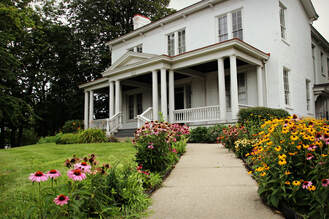|
But wait, there's more! Our volunteer community had a lot to share about what books and resources have made a difference for them in understanding the historical context of racial injustice. If you haven't seen it, check out We Keep Learning: Part I.
We are continual learners who strive to connect others to resources that our board, volunteers, and staff are finding helpful in that quest. We are currently reading, following, and listening to: Brynn:
Haley:
John: Films Amazing Grace (based on the origin of the hymn and the fight to end the British slave trade) Amistad (based on the famous 1839 rebellion on a slave ship and the aftermath) Almos’ a Man (based on Richard Wright’s short story; PBS American Short Story Film Series) The Autobiography of Miss Jane Pittman (based on the novel by Ernest J. Gaines) Do the Right Thing (written, produced, and directed by Spike Lee) I Am Not Your Negro (documentary based on an unfinished manuscript by James Baldwin) Essays Frederick Douglass, “What to the Slave Is the Fourth of July?” James Baldwin, The Fire Next Time and Notes of a Native Son Alice Walker, In Search of Our Mothers’ Gardens: Womanist Prose, especially the title essay Ta-Nehisi Coates, Between the World and Me Eve Fairbanks, “The ‘Reasonable’ Rebels,” Washington Post, 8/29/2019 Autobiography Frederick Douglass, Narrative of the Life of Frederick Douglass, An American Slave Harriet Jacobs, Incidents in the Life of a Slave Girl Malcolm X with Alex Haley, The Autobiography of Malcolm X (also Spike Lee’s film Malcolm X) Maya Angelou, I Know Why the Caged Bird Sings (also the film) Melba Pattillo Beals, Warriors Don’t Cry Short Fiction James Baldwin, “Sonny’s Blues” Langston Hughes, The Best of Simple Novels Charles Chesnutt, The Marrow of Tradition Ralph Ellison, Invisible Man Chinua Achebe, Things Fall Apart Toni Morrison, Song of Solomon and Beloved Ernest J. Gaines, A Gathering of Old Men and A Lesson Before Dying Octavia Butler, Kindred Caryl Phillips, Crossing the River Nnedi Okorafor, The Binti Trilogy: Binti, Binti: Home, Binti: The Night Masquerade Chimamanda Ngozi Adichie, Americanah Poems Paul Laurence Dunbar, “We Wear the Mask” Langston Hughes, Montage of a Dream Deferred Robert Hayden, “Those Winter Sundays” Experiences Seeing the signs for “White” and “Colored” as a child traveling in the South with my parents in the 1950s Teaching in the Xavier University E Pluribus Unum Program decades ago Listening to African American faculty and students at Xavier over the years Taking the 21-Day Racial Equity and Social Justice Challenge from the Cleveland YWCA in 2019 Docenting and leading discussions at Harriet Beecher Stowe House
2 Comments
Harriet wrote Uncle Tom’s Cabin in 1851-52 to draw light to the injustices of her own time. With the current challenges our nation faces, we are reminded that the legacy of Harriet's time still interferes with our nation’s journey towards an equitable society.
The Friends of Harriet Beecher Stowe House community values the ideas of historical literacy (http://stowehousecincy.org/aboutus.html. ) As part of our lead-in week to Harriet’s Virtual Birthday Party on Sunday June 14th, we want to share ideas and resources we have found helpful in our own learning process. We are continual learners who strive to connect others to resources that our board, volunteers, and staff are finding helpful in that quest. We are currently reading, following, and listening to: Abigail:
Christina:
Fred:
Robin:
6/11/2021 update: General admission hours will resume on Saturdays (10am-4pm) and Sundays (12pm-4pm). Tours by appointment will continue on Thursdays and Fridays. 7/9/2020 update: In the event that Hamilton county enters Level 4 (purple) in the Ohio Public Health Advisory System, the site will close to the public and re-open at the direction of the Ohio History Connection. 7/2/2020 update: Due to current high levels of virus spread in Hamilton County, masks will be required for all visitors. If you have a medical exemption request, please indicate this on your tour request form. Thank you for making plans to visit the Harriet Beecher Stowe House! We are thrilled to welcome you. For the health and safety of our visitors, volunteers, and staff, we have implemented new guidelines. Some highlights are below. You can CLICK HERE read our full re-opening plan. What you need to know:
 from the Board of the Friends of Harriet Beecher Stowe House: It was an interesting and cathartic moment. We were coming to the conclusion of our zoom board meeting, when one of the members paused and expressed her dismay at the death of Mr. George Floyd at the hands of the Minneapolis police department. This outrage has transcended racial and political lines. Protests have erupted around the country and overseas. Law enforcement officials, black and white, have expressed their concern and disagreement with the police tactic the world has seen. As in the case of Eric Garner in New York, Floyd’s words “I can’t breathe” have become the new plea of protest. The board meeting mentioned was a meeting of the Board of Trustees of Friends of Harriet Beecher Stowe House. Just like the outrage of our board member and others, there was another brave person who, over a century and a half ago, expressed her outrage about slavery and the treatment of people of color in this country: Harriet Beecher Stowe. Mrs. Stowe had received a letter from her sister in law, Mrs. Isabella Jones Beecher in which she said to Harriet: “If I could use a pen as you can, I would write something that will make this nation feel what an accursed thing slavery is.” According to Harriet’s children she read their aunt’s letter to them, then rose to her feet with crumpled letter in her hand, and declared, “I will write something, I will if I live.” She wrote Uncle Tom’s Cabin, published in 1852. The book profoundly transformed how Americans thought about the institution of slavery. It is said of Uncle Tom’s Cabin, that never before had the “curious institution” been so effectively contrasted with the ideals of American liberty and Christian virtue. Now 168 years after the publishing of her book and on the eve of her birthday, we the community of the Friends of Harriet Beecher Stowe House must declare our position as the vestiges of slavery in the form of institutional racism continue in the United States of America. The United States built its own freedom, in part, on the dispossession of one race and the enslavement of another. The problem of racism is deeply rooted in the nation’s very foundation. That was the profound truth that Harriet Beecher Stowe sought to communicate by writing Uncle Tom’s Cabin. Stowe intended that her work would cause her readers to see the humanity in others. As a people, our progress toward that goal has been at best piecemeal, and has had many setbacks. Recent events in Minneapolis and elsewhere make it very clear that we are still a long way from the ideal that Harriet Beecher Stowe sought to encourage. In homage to her, the Friends of the Harriet Beecher Stowe House join with people of goodwill everywhere in condemning senseless acts of racial violence. We look forward to the day when, as a nation, we can live up to the ideal that Harriet Beecher Stowe envisioned: seeing the humanity in others and advocating for freedom and opportunity for all people. |
Archives
March 2025
Categories
All
|
|






 RSS Feed
RSS Feed